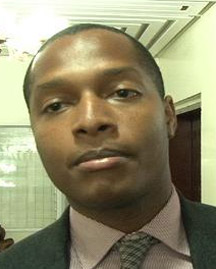Newly elected President of the Georgetown Chamber of Commerce and Industry (GCCI) Clinton Urling has said that a point has now been reached in the protracted discourses between the government and the private sector on the issue of tax reform where there is need for “a timeline” for the effective and efficient” settling of the issue.
Addressing a media briefing shortly after his election to the presidency to succeed Komal Ramnauth, Urling said that while a proper assessment of the status of the dialogue between government and the private sector on the issue of tax reform is best sought through the Private Sector Commission (PSC) it was his view that the discussions had gone on for a considerable length of time though the outcome of a study conducted on the issue two years ago was yet to be known. The outcome of the survey, he said, ought to provide “a sense of where we are” on the issue. As President of the GCCI, Urling now represents the Chamber on a private sector group engaged in direct dialogue with government on the issue of tax reform.
Meanwhile, in his first statement to the media following his election to the GCCI presidency Urling said that the Chamber wanted to make clear its independent and non-partisan position, a statement which appeared directed at critics who have charged that influential private sector operatives provide uncritical support for government’s policies. “We owe no allegiance to anyone,” Urling told the media briefing.

Urling said that to underscore its independence the Chamber will be setting up an Advocacy Committee which will be responsible for formulating and articulating the body’s collective position on important issues.
Last week the GCCI issued a statement in support of what Urling described at Friday’s media briefing as a “moderate and pragmatic” 2012 budget. In his statement last Friday Urling singled out the reference in the budget presentation to which the government had committed itself by announcing the infusion of $10m into the Small Business Bureau, one of the entities created under the 2004 Small Business Act.
The Chamber President acknowledged that limited access to commercial bank lending had constrained the growth of the local small business sector and repeated the call made by other private sector officials for the creation of a local development bank. At the same time he disclosed that as part of its immediate agenda the Chamber will be restoring to its front burner the idea mooted some time ago of creating a window that would facilitate membership for small businesses by possibly examining a system of tiers of membership dues that would render it affordable for smaller business houses.
Meanwhile, Urling told the media briefing that the Chamber is currently in the process of completing its work plan which he said will be finished “in two or three weeks time” and which will be shared with the media. He said that the new work plan will focus on, among other things, determining, based on a survey undertaken in 2011, how the Chamber can best respond to the needs of its members.
Responding to a question from Stabroek Business regarding the Chamber’s position on its previous involvement in supporting City Hall in restoring a measure of order to the capital, Urling said that while that commitment remained undiminished it was likely that the Chamber would now be issuing a call for the pursuit of local government reform. At the same time he said that it was the intention of the Chamber to communicate to members its concerns over various ways in which some commercial houses operate in violation of city laws.
The GCCI was established in 1889 and Urling is its forty-seventh President.




